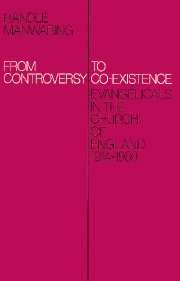Book contents
- Frontmatter
- Contents
- Acknowledgements
- Preface
- 1 Into battle
- 2 The defensive years
- 3 Through the Waste Land
- 4 Continuing nadir
- 5 The turning tide
- 6 Towards the conversion of many
- 7 Flood-tide of Evangelism
- 8 Anatomy of Evangelicalism
- 9 The Fundamentalist issue
- 10 The hard facts of Evangelicals and unity
- 11 The Honest to God debate
- 12 Liturgical debates
- 13 Charismatic differences
- 14 Keele – a watershed
- 15 Evangelical identity – a problem
- Notes
- Index
11 - The Honest to God debate
Published online by Cambridge University Press: 18 September 2009
- Frontmatter
- Contents
- Acknowledgements
- Preface
- 1 Into battle
- 2 The defensive years
- 3 Through the Waste Land
- 4 Continuing nadir
- 5 The turning tide
- 6 Towards the conversion of many
- 7 Flood-tide of Evangelism
- 8 Anatomy of Evangelicalism
- 9 The Fundamentalist issue
- 10 The hard facts of Evangelicals and unity
- 11 The Honest to God debate
- 12 Liturgical debates
- 13 Charismatic differences
- 14 Keele – a watershed
- 15 Evangelical identity – a problem
- Notes
- Index
Summary
The Anglican Church's penchant for producing, at least every few decades, a ‘turbulent priest’ was illustrated when the then Bishop of Woolwich, John A. T. Robinson, published his attack on Christian orthodoxy which he entitled Honest to God (S.C.M., 1963). Formerly a Cambridge don, he was a recognised New Testament scholar and also a liturgical scholar of deep pastoral insight, but his book burst on the Christian world with shattering results, popularising the radical theological discussion of the day. ‘The publication of this book was the event which loosed the long pent-up thunders of the gathering storm which exploded in a great and sudden roar, and the echoes of it have gone on reverberating round the hills of the world ever since.’
In one sense, Bishop Robinson was reacting against the success of the great Christian communicators of his times, people like C. S. Lewis, Dorothy Sayers and J. B. Phillips, by asserting that, even with their illuminating help, it was necessary to query the language of the Christian faith, originating with the Apostles. The bishop admitted that his thinking had been coloured by the writings of revolutionary theologians such as Paul Tillich (The Shaking of the Foundations), by the questions of Dietrich Bonhoeffer before he was hanged by the S.S. in Hitler's Germany and by Rudolf Bultmann. He questioned the language of Christianity which so often referred to God as being ‘up there’ or ‘out there’ and to Jesus Christ as ‘ascended to heaven’.
- Type
- Chapter
- Information
- From Controversy to Co-ExistenceEvangelicals in the Church of England 1914–1980, pp. 134 - 145Publisher: Cambridge University PressPrint publication year: 1985



